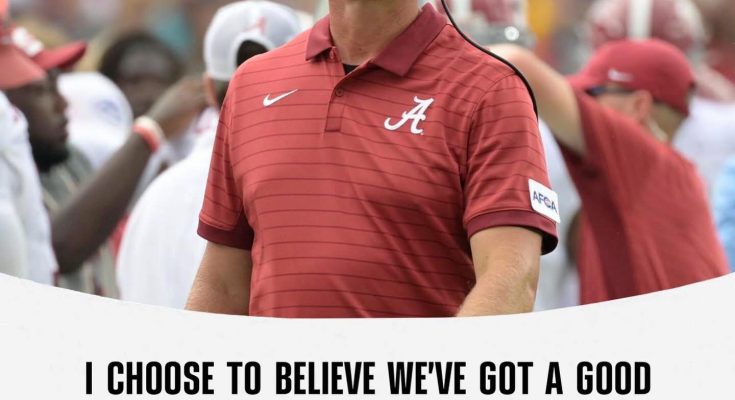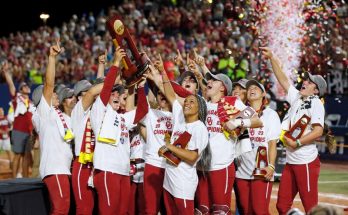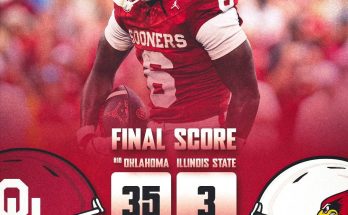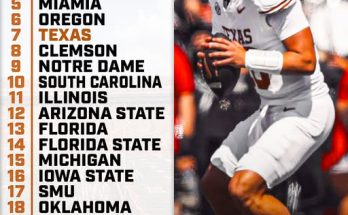Alabama football has long been synonymous with dominance, resilience, and an unmatched standard of excellence in college football. For more than a decade, the Crimson Tide under Nick Saban established themselves as not just a program but an empire, one that other schools across the nation measured themselves against. When Kalen DeBoer was announced as the new head coach, stepping into the shoes of a legendary figure like Saban, expectations were astronomically high, yet many understood the near-impossible weight he carried. After all, replacing a coach who defined an era is never straightforward, and every snap, every decision, and every result would be placed under a microscope. Following Alabama’s loss to Florida State, those magnifying glasses grew even sharper. Fans, analysts, and critics alike have begun weighing in heavily on what this defeat says about DeBoer, Alabama’s trajectory, and the state of college football as a whole.
The loss to Florida State wasn’t just a routine setback; it was a symbolic clash that represented more than one team falling short on the scoreboard. For Alabama, it became a moment of soul-searching. Florida State, with its explosive talent and revitalized identity, showed that the balance of power in college football isn’t fixed but rather shifting. Programs across the country are no longer intimidated by the aura of the Crimson Tide. Where Alabama once commanded fear, opponents now prepare with belief that they can compete—and win. That shift places even more pressure on DeBoer, who now faces the dual challenge of building his own identity as Alabama’s leader while also restoring the intimidation factor that once defined the Tide.
For DeBoer himself, this loss might become one of the defining early tests of his tenure. Great coaches are rarely judged solely by victories when they inherit programs of this magnitude; instead, they are judged by how they respond to setbacks. How he rallies his team, addresses weaknesses, and handles the inevitable noise surrounding the program will all reveal much about the kind of leader he will be moving forward. At Washington, DeBoer had proven himself capable of turning a program around, instilling confidence and precision in a short time. That reputation, however, is now facing its first true national crucible at Alabama.
The conversation around Alabama after this loss also extends beyond just X’s and O’s. It touches on culture, identity, and the emotional expectations of a fanbase used to being at the very top. For Crimson Tide fans, every season is championship-or-bust, and losses—even to elite opponents—are rarely tolerated with patience. That high standard is both a blessing and a burden for any Alabama coach. On one hand, it pushes the program to pursue greatness relentlessly. On the other hand, it creates an environment where growing pains are rarely given grace. DeBoer walked into that environment with full knowledge of the challenge, yet the reality of experiencing it firsthand after a high-profile loss is something entirely different.
One of the key talking points after this game has been whether Alabama’s issues are simply transitional or something more structural. Under Saban, the Tide always had a reputation for reloading, never rebuilding. The expectation was that five-star depth and disciplined coaching would allow the program to remain nearly immune to down years. Now, with DeBoer in charge, fans and media are beginning to wonder if that invincibility has faded. Is Alabama still the benchmark, or are they entering a new phase where they must climb back to the mountaintop instead of defending it? These are the kinds of questions that add weight to every Alabama game under DeBoer, and the Florida State loss has only amplified them.
The matchup itself highlighted some critical realities. Florida State’s speed and athleticism on both sides of the ball tested Alabama in ways that exposed vulnerabilities. The Crimson Tide offense, while showing flashes of explosiveness, lacked the sustained rhythm and ruthless efficiency fans had grown accustomed to seeing in the past. Defensively, the Tide still looked powerful in moments, but giving up key plays in crucial situations revealed that the unit has not yet reached the disciplined dominance of the Saban era. These observations aren’t meant as final judgments on DeBoer’s system, but they do raise urgent questions about whether Alabama’s identity is fully formed under its new leader.
Another layer to this story is the national landscape of college football itself. Programs like Georgia, Ohio State, Michigan, and now Florida State are circling at the top, eager to dethrone Alabama’s longstanding supremacy. The margin for error has never been smaller. For DeBoer, that means every loss is magnified not only in the context of Alabama’s fanbase but also in the broader battle for national relevance. If Alabama falters, even slightly, other programs are ready to step into the spotlight. That creates an even greater sense of urgency for the Tide to right the ship quickly.
For fans, the emotional reaction to this loss has been understandably intense. Some are already questioning whether DeBoer was the right choice to carry Alabama forward, while others preach patience and perspective, noting that one game cannot define a coach’s legacy. This division in the fanbase is natural, but it also speaks to the deep passion and expectation surrounding the program. DeBoer’s challenge will not only be winning football games but also managing those emotions, communicating his vision clearly, and earning trust in the process. He cannot—and should not—try to be Nick Saban. Instead, he must establish his own standard and prove to both his players and the fanbase that Alabama’s future is still bright.
It is also worth remembering that many legendary coaches endured rocky beginnings before building dynasties. Even Saban himself didn’t achieve immediate perfection; it was his ability to adjust, adapt, and evolve that cemented his status as a legend. DeBoer is now at a similar crossroads. His coaching philosophy emphasizes discipline, execution, and efficiency, but translating those principles into consistent dominance in the SEC takes time. The question is whether Alabama fans will allow him the time to make that transition, or whether the impatience of modern college football culture will create unnecessary turbulence.
Looking at the bigger picture, this loss could become a pivotal teaching moment for the Crimson Tide. Sometimes, defeat sharpens focus more than victory ever could. Players now understand that wearing the Alabama jersey doesn’t guarantee dominance—it must be earned every single week. DeBoer has the opportunity to use this moment as a rallying cry, instilling hunger and urgency in his team moving forward. If he succeeds in doing that, this loss may eventually be remembered as the spark that ignited a new era of Alabama football rather than the sign of decline.
For Florida State, this victory was monumental. Beating Alabama is still one of the most prestigious accomplishments in college football, regardless of circumstance. It validates the Seminoles as a program on the rise and reaffirms their place among the national contenders. That narrative only makes Alabama’s road tougher, as the Tide are no longer just chasing championships—they are now fighting to protect their reputation against a growing field of legitimate challengers.
Fans, of course, will continue debating what this game means in both the short and long term. Was this just one loss, or is it a warning sign of a more difficult era ahead? Should patience be extended to DeBoer, or should concern be heightened immediately? These debates are part of what makes college football so captivating—the passion, the differing perspectives, and the emotional investment of millions who live and breathe their team’s success.
For those reading, your voice matters in this discussion. Do you believe Kalen DeBoer is the right man to lead Alabama into its next great era, or do you worry that the Crimson Tide are slipping from their perch at the top of college football? Was the loss to Florida State an early bump in the road, or is it a sign of deeper issues that must be addressed quickly? Sharing your thoughts can help spark meaningful conversation not just about one game, but about the larger state of Alabama football and the evolving landscape of the sport itself.
This moment in Alabama football history is about more than just wins and losses. It is about transition, identity, and the test of whether greatness can continue under new leadership. Kalen DeBoer now has a chance to prove himself in ways that statistics alone cannot capture. How he responds to adversity, how he builds trust with players and fans, and how he crafts a vision for the program will all shape Alabama’s path forward. The Florida State game may be remembered as a loss in the standings, but it could also be remembered as the moment where DeBoer and Alabama began writing the next chapter of their story.
Now the question turns to you. What do you think this loss means for Alabama and for DeBoer’s tenure? Do you see this as growing pains, or as a warning sign? Alabama fans, college football enthusiasts, and even those who just love the drama of the sport—your perspective adds depth to this conversation. Don’t hold back. Share your thoughts, debate with fellow readers, and let your voice be part of the story as Alabama football continues its journey into a new era.



